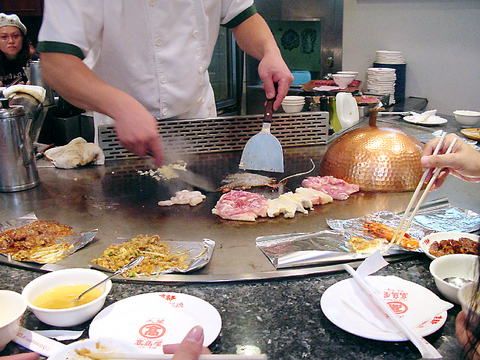Christmas shoppers are now hitting Taipei's many department stores and their food courts.
An indication of the quality of food on offer at Kyoto Teppanyaki Shop, located on the basement floor of the Dayeh Takashimaya Department Store, is the throng of patient shoppers waiting to have their fill. During the weekend, patrons often queue up to one hour to get a seat.
The restaurant's boss, Luo Zhong-liang (

PHOTO, DEREK LEE, TAIPEI TIMES
The restaurant's homemade black pepper sauce which takes four days to prepare is a winning recipe. For the sauce, Luo rejects the use of monosodium glutamate and salt. Rather, he uses ingredients such as chicken bones, onions and beef to produce the sauce's rich flavor. Luo boasted that the proprietors of many first-class teppanyaki restaurants in Taiwan do not expend the same amount of effort as he does to produce the sauce. The restaurant also uses homemade soy sauce which takes up to six days to prepare. Luo refused to reveal the soy sauce's secret ingredients, but would did say that more than 10 Chinese herbs are added to produce a distinctive taste.
Seven chefs man the hot plates cooking the 27 dishes offered on the menu. Each of the chefs has at least 14 years of experience in cooking teppanyaki and being able to talk to your chef from a close distance is one of the unique pleasures of eating a teppanyaki meal.
The chef will usually serve sauteed bean sprouts with soy sauce as the first course. A bowl of white rice and a small serving of fish soup with seaweed follow, just in time to accompany the main dish, be it sirloin or tenderloin steak, mutton, chicken or cod.
A tip to teppanyaki lovers is that the steak can be served in thin slices. The dish is served with shreds of onion dipped in a slightly sweet Japanese sauce. The sliced steak and onion is a delicious combination.

Even by the standards of Ukraine’s International Legion, which comprises volunteers from over 55 countries, Han has an unusual backstory. Born in Taichung, he grew up in Costa Rica — then one of Taiwan’s diplomatic allies — where a relative worked for the embassy. After attending an American international high school in San Jose, Costa Rica’s capital, Han — who prefers to use only his given name for OPSEC (operations security) reasons — moved to the US in his teens. He attended Penn State University before returning to Taiwan to work in the semiconductor industry in Kaohsiung, where he

On May 2, Chinese Nationalist Party (KMT) Chairman Eric Chu (朱立倫), at a meeting in support of Taipei city councilors at party headquarters, compared President William Lai (賴清德) to Hitler. Chu claimed that unlike any other democracy worldwide in history, no other leader was rooting out opposing parties like Lai and the Democratic Progressive Party (DPP). That his statements are wildly inaccurate was not the point. It was a rallying cry, not a history lesson. This was intentional to provoke the international diplomatic community into a response, which was promptly provided. Both the German and Israeli offices issued statements on Facebook

May 18 to May 24 Pastor Yang Hsu’s (楊煦) congregation was shocked upon seeing the land he chose to build his orphanage. It was surrounded by mountains on three sides, and the only way to access it was to cross a river by foot. The soil was poor due to runoff, and large rocks strewn across the plot prevented much from growing. In addition, there was no running water or electricity. But it was all Yang could afford. He and his Indigenous Atayal wife Lin Feng-ying (林鳳英) had already been caring for 24 orphans in their home, and they were in

Australia’s ABC last week published a piece on the recall campaign. The article emphasized the divisions in Taiwanese society and blamed the recall for worsening them. It quotes a supporter of the Taiwan People’s Party (TPP) as saying “I’m 43 years old, born and raised here, and I’ve never seen the country this divided in my entire life.” Apparently, as an adult, she slept through the post-election violence in 2000 and 2004 by the Chinese Nationalist Party (KMT), the veiled coup threats by the military when Chen Shui-bian (陳水扁) became president, the 2006 Red Shirt protests against him ginned up by